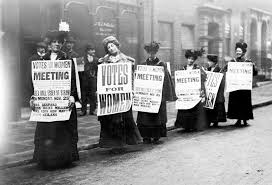suffragette
英 [,sʌfrə'dʒet]
美 [,sʌfrə'dʒɛt]
suffragette 争取妇女获取投票权运动的人来自 suffrage,投票,投票权,-ette,表阴性。字面意思即女性投票者,用于指 20 世纪初争取 妇女获得投票权运动的人。
- suffragette (n.)
- "female supporter of the cause of women's voting rights," 1906, from suffrage, with French fem. ending -ette, but not in the sense in which it was in vogue at the time.
suffragette. A more regrettable formation than others such as leaderette & flannelette, in that it does not even mean a sort of suffrage as they mean a sort of leader & of flannel, & therefore tends to vitiate the popular conception of the termination's meaning. The word itself may now be expected to die, having lost its importance; may its influence on word-making die with it! [Fowler, 1926]
Compare suffragist.
- 1. She was a suffragette and a birth control pioneer.
- 她参加争取妇女选举权的运动,也是节育倡导者。
来自柯林斯例句
- 2. The suffragette movement campaigned for votes for women in Britain and the US.
- 妇女参政运动为争取英国和美国妇女投票权而斗争.
来自《简明英汉词典》
- 3. Walden was secretly amused by the suffragette.
- 沃尔登对那个女权运动者暗自感到高兴.
来自辞典例句
- 4. In July 1909 , imprisoned English suffragette Marion Dunlop refused to eat.
- 1909.7, 被捕的英国女权主义者马里恩·邓洛普开始绝食.
来自互联网
- 5. After women obtained the right to vote, the suffragette movement became a dead duck in Britain.
- 妇女获得选举权后, 鼓吹妇女参政的妇女运动,在英国成了不能再引起人们举趣的问题了.
来自互联网
[ suffragette 造句 ]
